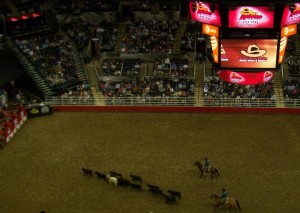 For all that my brothers, my sister, my daughter and I spent time atop a horse, we were never into it seriously enough to participate in or attend horse events; just never had the time, money or inclination. But a friend of ours had a pair of tickets to the San Antonio Stock Show and Rodeo last weekend, and then wasn’t able to go – so she gave us the tickets. We were at first a little disconcerted to see how far up in the rafters that our designated seats were – but I will have to say that we had an excellent view of the events that we did watch. And of course the utility of most of the events in relation to working cattle from horseback in the 19th century was perfectly plain to me.
For all that my brothers, my sister, my daughter and I spent time atop a horse, we were never into it seriously enough to participate in or attend horse events; just never had the time, money or inclination. But a friend of ours had a pair of tickets to the San Antonio Stock Show and Rodeo last weekend, and then wasn’t able to go – so she gave us the tickets. We were at first a little disconcerted to see how far up in the rafters that our designated seats were – but I will have to say that we had an excellent view of the events that we did watch. And of course the utility of most of the events in relation to working cattle from horseback in the 19th century was perfectly plain to me.
Team roping – of course, that was the best strategy to secure a near-adult and semi-feral longhorn in order to brand, mark and neuter, without risking certain death by goring or trampling. Drop a slip-line over the head, and catch it by the rear legs with another – and there was the cow immobilized. Looking at diagrams and descriptions of this, I had always suspected that sending that second rope low and catching a running animal by the feet was pretty hard. It was – only two of the seven or eight competitors that we watched were able to do this successfully.
Calf-roping – that also had utility; the contest is for the rider to rope the calf, dismount while the horse holds steady (or even backs up, to hold the lariat taut) while the rider flips the calf on it’s side and ropes three legs together with a short length of rope. Most of the competitors were able to accomplish this; but one rider drew a particularly feisty small black calf that fought him every inch of the way. This calls for a pretty clever and obedient horse, since the horse is doing about a third of the work.
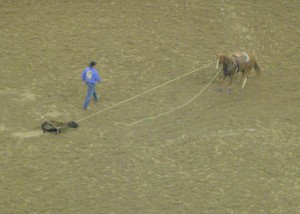
Bronco-busting also has historical roots in working cattle the old way; horses were often wild mustangs, nearly as feral as the cattle. Such were the times and utilitarian attitudes toward horses – who were merely warm-blooded, living tools in the eyes of cattle drovers – that such horses would have to become swiftly accustomed to being saddled, bridled and ridden. This was most commonly accomplished by applying saddle, bridle and strong-nerved rider to the untamed horse and letting it buck until exhausted … and repeating when necessary. I have to say that watching the bucking horses kick, twirl, spin and buck while the rider was bounced around like a floppy rag doll was enough to make my back hurt – but being able to stay in the saddle under circumstances like that was part of a horse-wrangler’s job description.
Some of the other events don’t seem to have such a historical pedigree, but grew out of later Wild West shows and the traveling rodeo circuit. They were purely entertainment, either for an audience or for bored young men to challenge each other; I wondered if the phrase “hold my beer – and watch this!” hadn’t been involved the first couple of times. Steer wrestling – that is, jumping out of the saddle of a running horse and flipping a running steer to the ground – is likely one of those. So is bull-riding; like bronco-busting, only with a bucking bull.
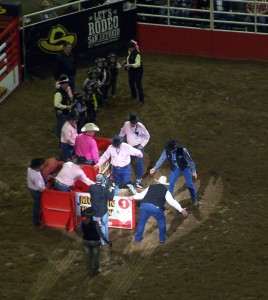
And a few events were just pure good fun; mutton-busting, for example. The sheep themselves didn’t seem particularly discommoded, and the children were all rather small – including a fearless three-year old girl, whose sheep, alas, seemed to have run right out from under her when the gate opened, before the assistants holding her steady could even let go. Barrel-racing evolved as suitable rodeo event for the ladies, very few of whom in the last century or the one before, had the upper-body strength necessary to wrestle steers to the ground by grabbing its head … or at least the sense not to try. And that was my afternoon at the rodeo – I do wish I could have been a little close to watching the rope-work. That would have been educational.

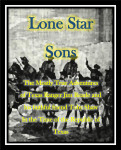
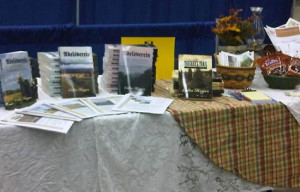
Recent Comments